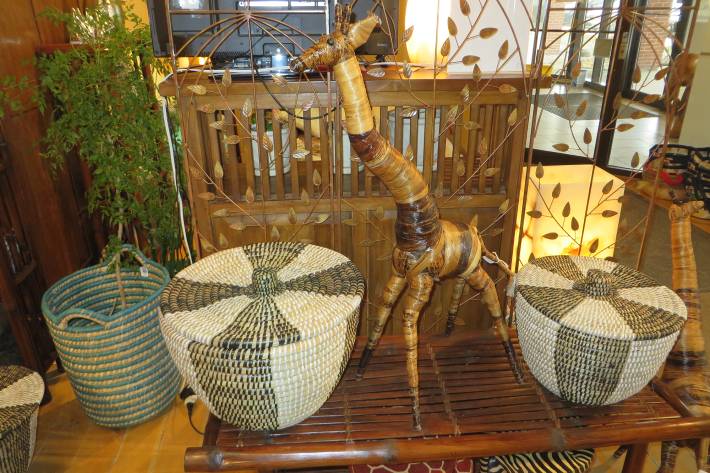Gender Equality Mainstreaming Digest – July 2016 Issue
Here are the highlights of this month’s Gender Equality Mainstreaming Digest! Click HERE for the full version.

Fair trade baskets hand made from recycled and natural components, available for sale in Canada through Ten Thousand Villages. Photo courtesy of D. Ceplis.
Highlights:
Opportunities and Upcoming Events:
Free online courses from Wageningen University – The rapidly increasing demand for nutritious food and its future consequences for the environment call for a much greater understanding of the global food system. WageningenX, by mobilizing a large and international community, addresses this need effectively by offering different massive online open courses (MOOCs) within its domain. The courses train (future) professionals in sustainable food systems and reach out to consumers to help them make informed choices about what they eat, how it is produced and the impact of their choices on the environment and society
This Month’s News:
Ethiopian Network for Gender Equality in Agriculture Established – The Women’s Affairs Directorate of the Ministry of Agriculture and Natural Resources (MoANR-WAD), with support from the Agricultural Transformation Agency (ATA) and UN WOMEN, recently established the Ethiopian Network for Gender Equality in Agriculture (ENGEA). The Network’s major objectives are to: create synergies between government, non-governmental organizations, development partners and research partners; develop and implement gender responsive agricultural policies, strategies, programs and projects in the sector; and to create platforms to share information and lessons. For Further information about the network please contact Ms. Zerthun Seyoum (MOANR-WAD Director) at zerthun.seyoum@gmail.com or Seblewongel Deneke at Seblewongel.Deneke@ata.gov.et.
Women Farmers Key to Ending Global Hunger – .Without a significant boost in financial support for women farmers, there is little hope of one day achieving zero hunger. That’s a key message of a new report from Canadian Foodgrains Bank, Equal Harvests–How Investing in Agricultural Development Can Empower Women.
Women lag in agriculture leadership roles – While many women work in the agri-food sector, few reach decision-making positions, says a report by the Canadian Agriculture Human Resources Council (CAHRC). Of 65 national and provincial associations reviewed to date, only eight have a woman as their board chairperson or president, and another eight have a woman in the second-in-command role of vice-president or vice-chair. The CAHRC report says there are ways to boost female participation, but setting quotas isn’t the way to go. Instead it recommends building awareness by expanding the recruitment pool and having diversity policies.
Reports Publications and Resources:
Building a resilient city for whom? Learning from street vendors’ gendered responses to urbanisation – In Hanoi, agricultural production and trading systems have changed since the macro-economic reform in the late 1980s, and the subsequent urbanisation of the city affected livelihoods of smallholders from both peri-urban and rural areas. However, the impacts of change are unevenly distributed among urban populations. Drawing upon examples of street vendors in Hanoi, this study explores the different ways in which male and female street vendors respond to change and how their responses shape current informal food systems in Hanoi.
A Gender-responsive approach to Climate-Smart Agriculture – A new FAO-CCAFS practice brief, A Gender-responsive approach to Climate-Smart Agriculture: Evidence and guidance for practitioners, was developed under the Global Alliance for Climate-Smart Agriculture (GACSA) and is one of a series. The brief calls for recognizing and addressing women’s and men’s needs, priorities, and realities in climate-smart agriculture (CSA) design and implementation to ensure they equally benefit. It focuses on CSA practices, but recognizes the need for a holistic gender-responsive approach at different levels (e.g. research and evidence-building; policy formulation; development of financial instruments, institutional change) to enhance the field of CSA.
The Gender Equality Mainstreaming (GEM) Working Group of the Agricultural Institute of Canada gathers information and articles on an ongoing basis on gender quality mainstreaming within agriculture, scientific research, rural development, climate change, organizational development and international development. The views and opinions presented are not necessarily representative of AIC.
Back issues of the GEM Digest are available here.
